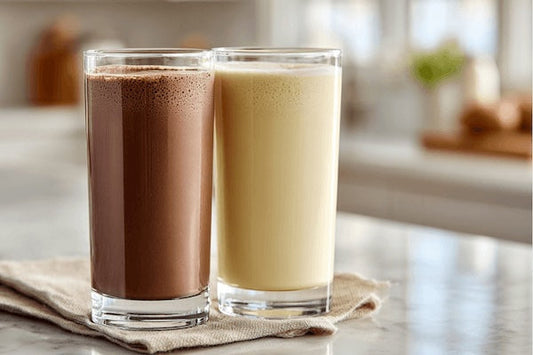Menopause is a natural life stage, but along with hot flashes and mood changes, many women notice an unwelcome shift: menopausal weight gain. For some, it feels as though extra pounds—especially around the belly—appear almost overnight and are harder to lose than ever before.
Understanding why it happens, the role of hormones, and practical solutions can help you manage your weight, protect your health, and feel more energised.
Why Women Experience Menopausal Weight Gain
During perimenopause and menopause, hormone levels shift dramatically. Lower oestrogen encourages fat storage in the abdomen rather than the hips and thighs. This belly fat—known as visceral fat—is particularly stubborn and can be harmful to your health.
At the same time, metabolism naturally slows with age, and muscle mass decreases. This means the body burns fewer calories at rest, making it easier to gain weight even if eating habits haven’t changed. Stress, poor sleep, and reduced activity levels can accelerate this process.
The Role of Hormones in Menopausal Weight Gain
- Oestrogen: Lower oestrogen levels cause a change in fat distribution, increasing abdominal fat storage.
- Progesterone: Declining progesterone can cause bloating and water retention.
- Testosterone: Less testosterone means reduced muscle mass, which lowers calorie burn.
These hormonal shifts alter the way your body uses and stores energy, making weight gain easier and weight loss harder.
The Dangers of Visceral Fat in Menopause
Visceral fat is the fat stored deep in your abdomen, surrounding vital organs like the liver and pancreas. It’s not just a cosmetic concern—it’s a health risk. Visceral fat is linked to:
- Increased inflammation
- Higher risk of heart disease and stroke
- Type 2 diabetes
- Certain cancers
- Cognitive decline
- Reducing visceral fat during menopause is about more than looking better—it’s about protecting your long-term health.

Effective Strategies for Reducing Menopausal Weight Gain
- Prioritise protein to preserve and build muscle.
- Incorporate resistance training 2–3 times per week.
- Cut back on refined carbs and added sugars to avoid insulin spikes.
- Manage stress with yoga, meditation, or walking to lower cortisol levels.
- Focus on sustainable calorie control rather than extreme dieting.
Meal Replacement Shakes: A Simple Solution for Women in Menopause
One practical and proven tool for managing menopausal weight gain is incorporating high-protein, nutrient-dense meal replacement shakes into your daily routine.
Benefits include:
- Calorie control without calorie counting
- High protein to support muscle mass and satiety
- Balanced nutrition with essential vitamins and minerals
- Convenience for busy lifestyles
- Stable blood sugar to reduce cravings
Eve Biology’s 4 Week Menopause Plan: Real Results Without Calorie Counting
Eve Biology’s 4 Week Menopause Plan is designed specifically for women navigating menopause. Participants replace breakfast and lunch with Eve Biology’s high-protein meal replacement shakes Monday to Friday and enjoy a hearty, balanced evening meal—no calorie counting required.
The results speak for themselves:
- Average weight loss: 5.36 lbs
- Average waist size reduction: 4.9cm
- 87% reported improved energy
- 96% experienced reduced anxiety
- 72% saw a reduction in bloating
- 85% reported better sleep patterns
This approach works because it combines calorie control with optimal nutrition, while still allowing for satisfying evening meals. For women struggling with menopausal weight gain, it’s a simple, structured solution that fits into real life.
According to Eve Biology nutritionist Sarah we tend to over estimate the amount of protein we’re eating. For instance a 100g steak isn’t 100g protein, it contains around 25g of protein. Sarahs recipes, free with the plan, ensure you get enough protein while keeping carbs low.

"We use protein to boost metabolism and help maintain muscle. We also balance blood sugar by keeping to a lower carb way of eating. Carbs increase insulin, a fat storage hormone which also dramatically affects appetite hormones. When we lower carbs especially avoiding processed foods and inflammatory oils we balance the other hormones"
Final Thoughts
Menopausal weight gain is common—but not inevitable. By understanding the hormonal changes at play, addressing visceral fat risks, and incorporating sustainable solutions like meal replacement shakes, you can manage your weight and support your overall well-being.
With evidence-backed plans like Eve Biology’s 4 Week Menopause Plan, it’s possible to lose weight, boost energy, improve sleep, and feel confident again—without extreme dieting.
FAQ 1: Can meal replacement shakes really help with menopausal weight gain?
Yes—when used as part of a balanced plan. High-protein, nutrient-rich meal replacement shakes can help control calories without leaving you hungry, support muscle maintenance, and stabilize blood sugar levels. They’re especially effective when replacing one or two meals a day alongside a healthy, balanced dinner.
FAQ 2: What makes Eve Biology’s 4 Week Menopause Plan different?
Eve Biology’s plan is designed specifically for women in menopause. Participants replace breakfast and lunch Monday–Friday with a nutrient dense meal replacement shake, then enjoy a hearty evening meal—no calorie counting. In trials, women lost an average of 5.3 lbs in 4 weeks, with 88% reporting better energy, 96% reduced anxiety, and 88% improved sleep.
FAQ 3: Will I be hungry if I replace meals with shakes?
Not with a properly formulated shake. Eve Biology’s shakes are high in protein and prebiotic fibre, which help keep you feeling full for hours. Most participants find they have steady energy and fewer cravings compared to traditional dieting.
FAQ 4: Do I need to cook separate meals on the plan?
No. You'll receive high protein recipes for satisfying high protein dinners which the whole family can enjoy. The goal is not strict restriction, but sustainable, healthy eating habits that support weight loss and hormone balance.
FAQ 5: Why do women gain weight during menopause?
During menopause, oestrogen levels drop, which shifts fat storage from the hips and thighs to the abdomen. This hormonal change, combined with a slower metabolism and muscle loss, makes it easier to gain weight—even without changing eating habits. Stress and poor sleep can also make menopausal weight gain worse.
FAQ 6: What is visceral fat and why is it dangerous in menopause?
Visceral fat is fat stored deep inside the abdomen, surrounding vital organs like the liver and pancreas. In menopause, declining oestrogen increases the risk of storing more visceral fat. This type of fat is linked to heart disease, type 2 diabetes, certain cancers, and cognitive decline, making it important to manage through diet and exercise.






